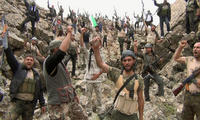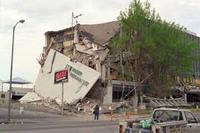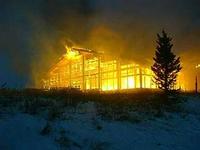-
FBI monitors Americans back from fighting in rebel ranks in Syria

Western intelligence services estimate that 2,100 Europeans and seventy Americans have fought in Syria. U.S. intelligence officials report that some of these Americans have returned to the United States and are under FBI surveillance. There is a concern that individuals who have been trained by al-Qaeda affiliates will ultimately use their battlefield experience to launch attacks in the United States.
-
-
Attack on California power station heightens concerns about grid security
Security experts are concerned that last year’s unsolved attack on an electrical-power substation in San Jose, California, is but a prologue to similar attacks which, if executed simultaneously and in a coordinated fashion against several such substations, could cripple the U.S. power grid. The transformers at the substation, vital for regional power distribution, were shot at by several gunmen and disabled for twenty-seven days. What is especially worrisome, security exert note, is that the attack appeared to have been carried out by people with some training, although the FBI said the agency does not think it was the act of terrorists.
-
-
First full-system mechanical environment test of B61-12 nuke completed successfully
The U.S. National Nuclear Security Administration (NNSA) announced the successful completion of the first full-system mechanical environment test of the B61‑12 as part of the NNSA’s effort to refurbish the B61 nuclear bomb. This first full-system mechanical environment test is one of several critical milestones for the B61-12 Life Extension Program (LEP). The B61-12 will replace the existing B61-3, -4, -7, and -10 bombs. Fielding the B61-12 will also enable the retirement of the B83, the last U.S. megaton class weapon, in the mid-to-late 2020s.
-
-
DHS alerts Russia-bound airlines of toothpaste tube bombs risk
The U.S. intelligence and counterterrorism agencies have advising airlines flying to Russia to be aware of the possibility that explosive materials could be concealed in toothpaste or cosmetic tubes. DHS issued a bulletin to airlines flying into Russia alerting them to the potential threat. The new concern about explosive toothpaste tubes notwithstanding, the biggest worry is still Islamist groups based in southern Russia’s Caucasus region.
-
-
Assessing the risk of terrorism at the Winter Olympics

The Winter Olympic Games in Sochi, Russia, open tomorrow. New background report examines history of terrorism in Russia and acts of terrorism directed at the Olympics Games and other sporting events. “The analysis [in the background report] indicates that there is no consistent increase or decrease in the frequency of terrorist attacks during the Olympics, suggesting that efforts to reinforce security are generally effective at mitigating any potential threats that may exist,” says Erin Miller, program manager for the START’s Global Terrorism Database (GTD) and the author of the report.
-
-
Snowden’ leaks derailed important cybersecurity initiatives
Edward Snowden’s leaks created such a climate of distrust around the NSA that many important cybersecurity initiatives died, stalled, or became non-starters. Security experts say that this is a case of throwing the baby out with the bathwater, and that the result of these stalled cybersecurity initiatives is that the United States is now more vulnerable to cyberattacks on its infrastructure, and government agencies and American corporations more exposed to sensitive information being compromised and stolen. U.S. officials have found it more difficult to respond to cyberattacks from Russia, China, and elsewhere. “All the things [the NSA] wanted to do are now radioactive, even though they were good ideas,” says James Lewis, a cybersecurity expert at the Center for Strategic and International Studies(CSIS).
-
-
Quake-vulnerable concrete buildings in Los Angeles area identified

Researchers have identified nonductile concrete buildings constructed before roughly 1980 in the Los Angeles area. This category of buildings is known from experience in previous earthquakes to have the potential for catastrophic collapse during strong earthquakes. Nonductile concrete buildings were a prevalent construction type in seismically active zones of the United States before the enforcement of codes for ductile concrete which were introduced in the mid-1970s. A companion study estimates that approximately 17,000 nonductile reinforced concrete buildings are located in the most highly seismic areas of California. More than seventy-five million Americans in thirty-nine states live in towns and cities at risk for earthquake devastation.
-
-
Two Austrian athletes threatened with kidnapping if they compete at Sochi
Two Austrian athletes — Alpine skier Bernadette Schild and skeleton racer Janine Flock, the current European champion— have received letters warning them to cancel their plans to compete in the Sochi Winter Games. The letters said that if they did attend the Games, they will be kidnapped. The letters are in line with threats made by Islamist militants in the Caucuses that if the Winter Games opened as scheduled on Friday, then the athletes participating in the Games, the spectators, and Russian security personnel would all be considered fair targets for attack. Similarly threatening letters were last month sent to delegations in several countries.
-
-
Kansas debating expanding definition of terrorism
Lawmakers in Kansas are debating a bill to expand the definition of “furtherance of terrorism” and allow victims of acts of terrorism to seek civil penalties from those convicted of terrorism. House Bill 2463 is modeled after an Arkansas law passed following an attack on a military recruiting office by Abdulhakim Mohamed. The foiled bomb plot at the Wichita airport in December 2013 gave Kansas persuaded lawmakers to emulate Arkansas’ example.
-
-
Florida mulling banning school collection of students’ biometric information
Some school districts in Florida, including Polk County and Pinellas County, are using scanners to collect fingerprints and hands, eyes, and voice characteristics from students. Pinellas County school district allows students to use palm scans instead of cash to pay for meals in the cafeteria. The collection of students’ biometric information has alarmed many parents who are concerned that students’ identity or personal records may be stolen or sold to private companies. Florida state legislators are debating a proposal which would stop school districts from collecting biometric information from students.
-
-
Islamist Syrian rebels train foreign fighters for terrorist attacks in home country
The numbers of Australian Islamists who have traveled to Syria to join the anti-regime rebels far exceed those of Australian Islamists who have traveled to other conflicts, including the wars in Afghanistan and Iraq. This is especially worrisome since Al-Qaeda-affiliated groups in Syria are gaining ground in their campaign to recruit foreign fighters to launch terrorist attacks when they return home. U.S intelligence has discovered training complexes in Syria for foreign fighters to learn techniques which equip them with the know-how to conduct terrorist acts when they go back to their home countries.
-
-
"Envy-free” algorithm may help in settling disputes
Whether it is season tickets to Green Bay Packers’ games or silver place settings, divorce and inheritance have bred protracted disputes over the assignment of belongings. Now, a trio of researchers has found a method for resolving such conflicts in an envy-free way. The envy-free algorithm may be used by negotiators in intractable political or territorial disputes. “The problem of fairly dividing a divisible good, such as cake or land, between two people probably goes back to the dawn of civilization,” write the authors.
-
-
Arizona lawmaker pushes measure to limit NSA operations in the state
Arizona State Senator Kelli Ward, a tea party Republican representing the Lake Havasu area, is pushing a bill in the State Senate which would impose limits on the ability of the NSA to operate in Arizona. In December Ward became the first legislator in the nation to declare she would introduce legislation to limit NSA activities in the state, and so far legislators in twelve other states have introduced similar bills. Arizona SB 1156 would. Among other things, prohibit local and state law enforcement officials from cooperating with the NSA and would prevent state or local prosecutors from using NSA-collected information which had not been obtained with a warrant. The bill would also withhold funds from state universities and colleges supporting the NSA with research or recruitment. Legal scholars say the courts would in all likelihood strike down Ward’s measure because Arizona, in essence, is trying to regulate the federal government.
-
-
National Guard units help states ward off cyberattacks
Governors across the United States are mobilizing their states’ National Guard units to combat threats from cyberattacks. The state of Washington was the first state to assign the state’s National Guard cybersecurity responsibilities. The state recognized the potential of its National Guard as a cyberforce when it realized that many of its soldiers, who are full-time employees and part-time soldiers, worked for tech employers such as Google, Boeing, Cisco, Verizon, and Microsoft.
-
-
Eco-terrorist sentenced to five years and ordered to read Malcolm Gladwell’s book

Last Monday, Chief U.S. District Judge Ann Aiken imposed a 5-year sentence on radical environmental activist Rebecca Rubin for her involvement in several acts of arson, including the burning of Vail Colorado’s Twin Elks Lodge which caused millions of dollars in damage. Rubin spent almost eight years living underground, giving herself up to the FBI last October. She pleaded guilty to arson, attempted arson, and conspiracy to commit arson in connection with a radical environmental group calling itself The Family. Judge Aiken also ordered Rubin to read Malcolm Gladwell’s 2013 book David and Goliath, explaining that Rubin might learn a thing or two about non-violent environmental advocacy while serving her sentence.
-
More headlines
The long view
Factories First: Winning the Drone War Before It Starts
Wars are won by factories before they are won on the battlefield,Martin C. Feldmann writes, noting that the United States lacks the manufacturing depth for the coming drone age. Rectifying this situation “will take far more than procurement tweaks,” Feldmann writes. “It demands a national-level, wartime-scale industrial mobilization.”
No Nation Is an Island: The Dangers of Modern U.S. Isolationism
The resurgence of isolationist sentiment in American politics is understandable but misguided. While the desire to refocus on domestic renewal is justified, retreating from the world will not bring the security, prosperity, or sovereignty that its proponents promise. On the contrary, it invites instability, diminishes U.S. influence, and erodes the democratic order the U.S. helped forge.
Fragmented by Design: USAID’s Dismantling and the Future of American Foreign Aid
The Trump administration launched an aggressive restructuring of U.S. foreign aid, effectively dismantling the United States Agency for International Development (USAID). The humanitarian and geopolitical fallout of the demise of USAID includes shuttered clinics, destroyed food aid, and China’s growing influence in the global south. This new era of American soft power will determine how, and whether, the U.S. continues to lead in global development.
Water Wars: A Historic Agreement Between Mexico and US Is Ramping Up Border Tension
As climate change drives rising temperatures and changes in rainfall, Mexico and the US are in the middle of a conflict over water, putting an additional strain on their relationship. Partly due to constant droughts, Mexico has struggled to maintain its water deliveries for much of the last 25 years, deliveries to which it is obligated by a 1944 water-sharing agreement between the two countries.
How Disastrous Was the Trump-Putin Meeting?
In Alaska, Trump got played by Putin. Therefore, Steven Pifer writes, the European leaders and Zelensky have to “diplomatically offer suggestions to walk Trump back from a position that he does not appear to understand would be bad for Ukraine, bad for Europe, and bad for American interests. And they have to do so without setting off an explosion that could disrupt U.S.-Ukrainian and U.S.-European relations—all to the delight of Putin and the Kremlin.”
How Male Grievance Fuels Radicalization and Extremist Violence
Social extremism is evolving in reach and form. While traditional racial supremacy ideologies remain, contemporary movements are now often fueled by something more personal and emotionally resonant: male grievance.
